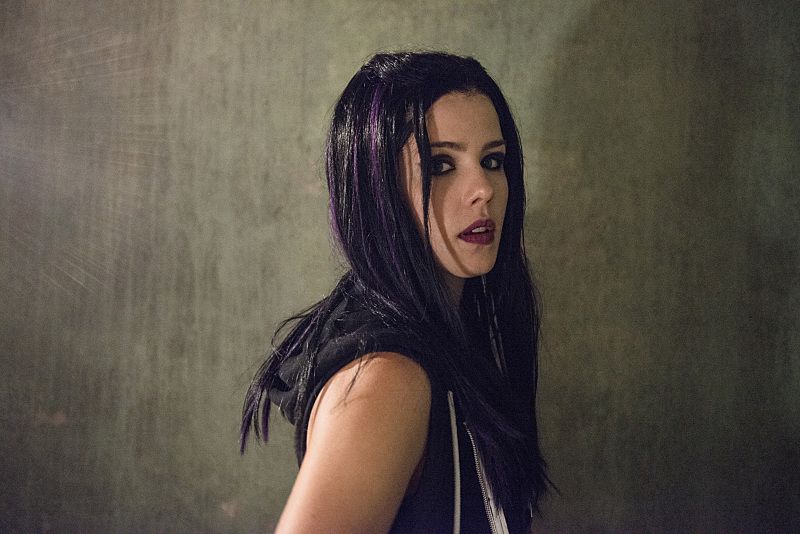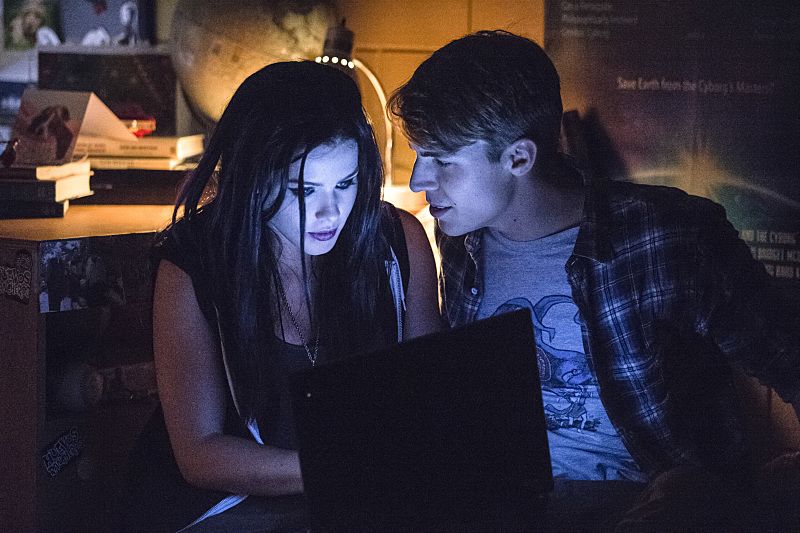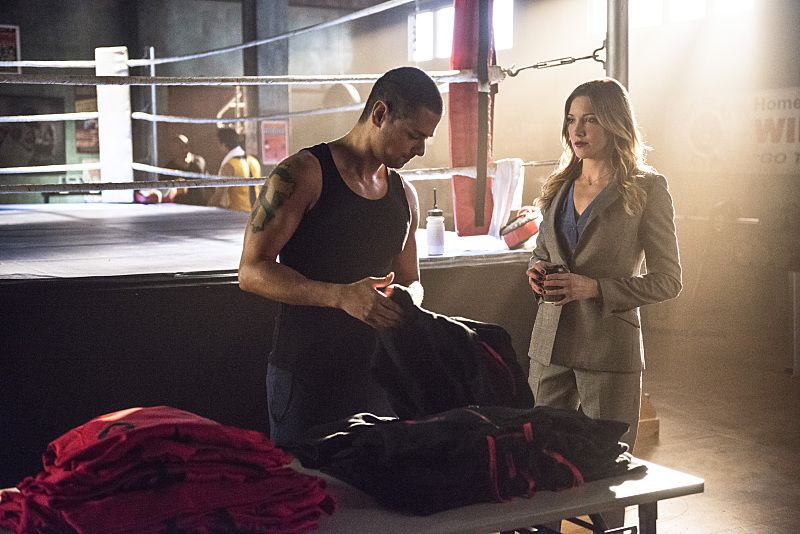Felicity Smoak has become the heart and soul of the CW version of the DC Universe, serving as an inspiration to two heroes, The Flash and Arrow. The dark and driven Oliver Queen has expressed his love and admiration for Felicity on more than one occasion, as has the bright and hopeful Barry Allen. She has no superpowers, but Felicity Smoak has made a difference in the DC Universe.
And finally, after 50 episodes, Arrow this week revealed who she was before becoming entangled with Oliver Queen, in the aptly titled “Secret Origin of Felicity Smoak.
Nowhere is the difference between Felicity and the rest of the players on Arrow more evident than in the opening workout montage. We see Oliver and Roy Harper stick fighting, Laurel Lance and Ted Grant boxing and Malcolm Merlyn and Thea Queen practicing their swordsmanship, but Felicity, dear, normal Felicity, is struggling with a few simple sit-ups. The sequence plays well for comedic effect, but it also drives home that she survives (and thrives) in the violent world of Starling City through her wits and will. From there, Felicity is visited by the always-welcome Ray Palmer, and, surprisingly, by her mother Donna (played by Charlotte Ross), which brings us to the meat of the episode.
We now know the background of Felicity, eternal second fiddle and support staff, the woman who props up others while never asking much for herself: Hidden behind the smile, there’s a darkness in her past.
During her formative years, she was a trouble-making hacker who, with her boyfriend Cooper Seldon, would disrupt Starling City’s elite. The flashback presents a very different Felicity than we’re used to, an ebony-haired goth genius who had no problem writing computer viruses that could cripple the city she would one day risk her life to protect. This Felicity was angry at the world and her mother, and her actions would spell trouble in the future. (Special props for Felicity dressing in one scene as the spitting image of Neil Gaiman’s Death, ankh and all.)
Fast forward to the present, and Starling City is being shut down by something very familiar to DC fans. Someone calling himself Brother Eye had turned Felicity’s virus on the city, triggering blackouts and riots. That’s right, the consciousness behind OMAC has been introduced to DC television, and it was created by Felicity Smoak. While distraught that her actions have caused so much chaos, she accepts responsibility, even if she is confounded by how to stop her own creation.
Despite a quickly introduced red herring (Seldon and Felicity’s roommate), it’s pretty clear the culprit behind Brother Eye is Seldon himself. Seldon, who sent for Donna Smoak to use as leverage to manipulate Felicity, is disgusted that his ex is now working for The Man. The episode delves into some clumsy political territory by establishing that the NSA had faked Seldon’s death, after which he grew even more nihilistic working under the agency. But that can be forgiven because of how wonderfully character-driven the episode is, especially when that character is as fully realized as Felicity Smoak.
Early on, the stark contrast between Felicity and her mother is played for laughs, with the cleavage-baring Donna making her shy, cerebral daughter turn more red-faced with every word. But as the episode progresses, it becomes clear Donna is more than comic relief; she’s the one who worked so Felicity could get the education she would need to become a guardian of Starling City. It was Donna who passed down the toughness that would allow Felicity to stand by two iconic heroes without blinking an eye. The episode takes a character that could have been a one-off joke and turned her into a three-dimensional figure whose great power was her ability to raise a good daughter. After all the familial drama with the Lances and the Queens, it’s just nice to see a normal family with normal ties.
That, of course, leads us to wonder who Felcity’s father is. However, that’s a question for another day, as today we see Oliver, Roy and Diggle take down Seldon and Brother Eye (in my dreams it leads into an OMAC and Kamandi spinoff), and Felicity find a new respect for the mother who once embarrassed her.
Before we move on to the rest of the team, I must reiterate what a delight Brandon Routh is as Ray Palmer; he’s an understated presence that plays so perfectly against Felicity. Routh is quickly becoming my favorite part of DC’s television universe, and he hasn’t even shrunk (yet).
Palmer isn’t the only character on the road to becoming a DC legend. Laurel Lance’s path to heroism continues this week with her learning a valuable lesson in control. During the Brother Eye-induced riots, Lance got to play district attorney for a day. She ordered riot police to an incident at a bank, which almost turned deadly before Oliver and Roy stepped in. Laurel learns from mentor Ted Grant not to react to situations with anger. Their relationship is interesting to watch evolve, but if producers are going to ask viewers to buy Laurel as a hero equal to Sara and Ollie, they’re going to have to have her stop screwing up at least once an episode. Case in point, she still hasn’t told her father about Sara’s death; you just know this is going to end badly.
Speaking of endings, this episode’s arrived with a huge shock. Remember how Roy mentioned a few times he was having bad dreams? Well, those concern him murdering Sara Lance. Whether this is true or whether Roy is under some sort of mind control remains to be seen, but this obviously could lead to huge ramifications.




